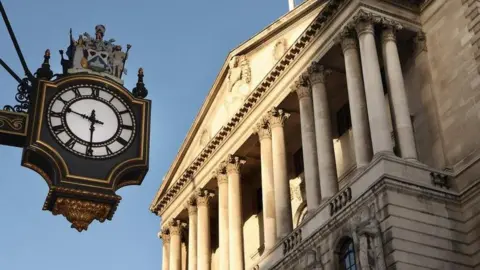The International Monetary Fund (IMF) has projected that the Bank of England is likely to implement three additional interest rate cuts within this year as the United Kingdom faces higher-than-expected inflation rates. According to the IMF’s recent report, the UK’s inflation is anticipated to be the highest among advanced economies globally, estimated at 3.1%. This uptick in inflation can be attributed primarily to escalating bills for essential utilities, particularly energy and water.
In a broader sense, the IMF has revised its growth forecast for the UK economy downwards, indicating an expected growth rate of merely 1.1% for 2025, a reduction from a prior estimate of 1.6%. This downward trajectory is influenced by various international factors, notably the repercussions of trade tariffs imposed by the United States which have hampered economic outlooks across multiple nations. The report, which surfaced as key economic leaders congregated in Washington for the IMF’s spring meeting, encapsulates the challenges the UK is facing while maintaining economic stability.
Despite such downgrades, the outlook for the UK appears slightly better when compared to its European counterparts, such as France, Italy, and Germany. The IMF emphasized that the ramifications from President Trump’s tariffs, which significantly raised the cost of borrowing and attempted to curtail inflation, played critical roles in this economic adjustment. The fund’s chief economist, Pierre-Olivier Gourinchas, indicated that the Bank of England is expected to reduce interest rates by three more installments in 2025, following a recent quarter-point cut enacted in February of this year.
Additionally, the report highlighted a paradoxical situation wherein the tariffs could inadvertently slow the escalation of UK price increases, as importation routes and trading partners adjust. The IMF anticipates that UK inflation will gradually decelerate to around 2.2% by 2026, approaching the Bank’s target of 2%. In light of these forecasts, Chancellor Rachel Reeves underscored a significant point, noting that despite global challenges, the UK is projected to experience stronger economic growth relative to other major European nations by 2025.
In her comments, Reeves reiterated the necessity for the UK to advocate for its trade interests on international platforms. She was scheduled to engage with US Treasury Secretary Scott Bessent, illuminating the UK’s objectives regarding a trade agreement with the United States, aimed at reducing or possibly eliminating tariffs on British imports.
The IMF report also elaborated on the broader trajectory of the global economy, which it claims is still recovering from substantial shocks experienced over the last four years. The IMF noted that the current economic situation is under considerable strain once more, with the US experiencing the most significant downgrade in growth forecasts among advanced nations, now standing at 1.8%, a stark fall from a previous estimate of 2.7% made in January of this year.
The backdrop of escalating trade tensions serves to deepen the complexities faced by the UK and the broader international marketplace. President Trump’s tariff policy has sparked a rolling trade war, with substantial tariffs being imposed on imports from nations including China, while reciprocal tariffs have been levied against American goods by other countries. The overarching intention, according to the Trump administration, is to incentivize domestic consumption, elevate tax revenue, and spur investment within the US economy.
In summary, the ramifications of these economic forecasts as detailed by the IMF will necessitate strategic responses from UK policymakers, drawing on both domestic fiscal measures and international dialogue to navigate the evolving challenges posed by global trade dynamics and inflationary pressures.



